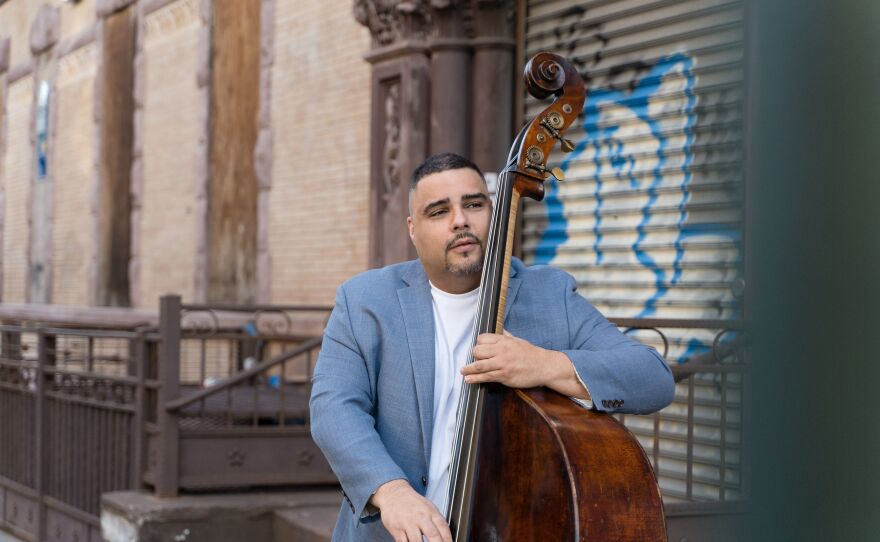Carlos Henriquez, "The South Bronx Story"
Anyone in the greater orbit of Jazz at Lincoln Center has long understood the depth of authority and feeling that Carlos Henriquez brings to his role as a bassist. An anchor of that institution's resident orchestra since 1998, he has steadily grown as a composer, arranger and bandleader — an evolution that's abundantly clear on The South Bronx Story, which will be released on Tiger Turn this Friday. A surefooted dispatch from the contemporary wing of Latin-jazz, it's also a clear-eyed reflection on Henriquez's Nuyorican heritage, and the neighborhood that nurtured and produced it.
The album's title track, which premieres at WBGO, sets the tone straightaway. As a veteran big band player, Henriquez knows how to develop intrigue through ensemble call-and-response, which he employs in his compact horn section. And he sets up different frameworks for a pair of sterling solos: by tenor saxophonist Melissa Aldana, radiating rhythmic self-assurance, and trumpeter Terell Stafford, initiating a shift to cruising swing. (The montuno, which precedes the closing head, is the work of pianist Robert Rodriguez, percussionist Anthony Almonte and drummer Obed Calvaire.)
Melanie Charles, "Woman of the Ghetto (Reimagined)"
How does a jazz vocalist announce a major-label signing in 2021? It's hard to imagine anybody doing it with more panache than Melanie Charles. Her debut for Verve, due out on Oct. 22, will be titled Y'all Don't (Really) Care About Black Women. It's a collection of handpicked covers from the label catalog, with a focus on outspoken women like Abbey Lincoln, Billie Holiday, Sarah Vaughan — and Marlena Shaw, whose 1969 anthem "Woman of the Ghetto" provided Charles with a potent lead single and music video (directed by AnAkA). The harpist on the track is Brandee Younger; the hand percussionist is Markus Schwartz. And the video stars Charles' mother, Maryse Jean-Baptiste. "While we were in lockdown, a conversation that we were having was about how kids who were poor children who did not have access to computers or internet were struggling to sustain their education in the midst of lockdown," Charles says, in a press statement. "I also wanted to highlight how you can come from the ghetto or from the hood, but present more than just the stereotype of the ghetto."
Kiefer, "curly"
Kiefer Shackelford, who records under his first name, was born in San Diego and trained in the jazz studies program at UCLA, where his mentors included guitarist Kenny Burrell. Over the last several years, as part of the Stones Throw roster, Kiefer has advanced a personal new breed of contemporary instrumental music — chilled out, beat-oriented, subtly but undeniably jazz-inflected. His new album, When There's Love Around, is an openhearted sonic journey that recalls 1970s-vintage Bob James one moment and 2010s-era Robert Glasper the next. On "curly," the album's third single, listen for the hook he introduces at 2:10, followed by relaxed yet assured piano solo.
Nala Sinephro, "Space 3"
A young electric harpist and keyboardist acutely aware of the spiritual legacies at her fingertips, Nala Sinephro seems poised for a breakout — and her forthcoming concept album on Warp, Space 1.8, will be the vehicle that makes it happen. The album consists of eight concise pieces, titled in sequence; "Space 3," its lead single, packs a lot of astral intrigue and incipient beat science into its 74-second running time. Sinephro plays modular synthesizers on the track, alongside the synth bass of Wonky Logic and the drumming of Eddie Hick; elsewhere on the album, you'll hear saxophone playing by Nubya Garcia, James Mollison and Ahnansé.
Jeremiah Cymerman, "From the Metaphysical to the Transcendental (for Bill Smith)"
Clarinetist and composer Jeremiah Cymerman has been a prolific and multifaceted figure within experimental music circles in New York (not only in performance settings, but also in podcast form). On a new solo clarinet album, Citadels & Sanctuaries, Cymerman celebrates his formative influences — devoting one track apiece to creative mavericks like Morton Feldman, Alvin Lucier and Tony Scott. The opening track is "From the Metaphysical to the Transcendental," dedicated to Bill Smith, who died in February at 93. "A true visionary of jazz, classical and electroacoustic music for over sixty years, Bill quite literally re-invented the language of the clarinet," Cymerman writes in an accompanying note. His reverence is no less apparent in the music, piece incorporates lyrical subtones and ghostly electronics, to beautiful effect.






